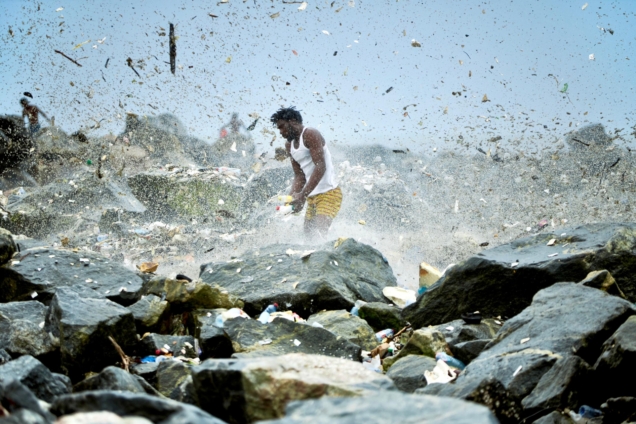With every heavy rainfall, the shoreline where the Korle Lagoon meets the sea transforms into a site of frantic activity.
Men, women, and children flock to the polluted coastline to scavenge through mountains of waste deposited by the swollen lagoon.

When the rains pour, the lagoon, choked with plastic, foam, and other refuse, overflows and carries its burden of pollution into the sea. The result is a beach covered in trash, which, for many marginalized families, becomes an opportunity to seek out materials they can sell or repurpose.

Amid the debris, individuals can be seen with sacks, buckets, and improvised tools, sorting through the waste for plastics, metal scraps, or anything of value. For these communities, the dangerous and unsanitary conditions are an everyday reality.
“When the rains come, it’s like a blessing and a curse. There’s more waste to pick, but the waves are stronger and more dangerous,” said a young scavenger.

In one striking moment, captured on camera, a man is seen braving the spray of crashing waves, debris flying around him like projectiles. Others nearby, undeterred by the chaos, continue to rummage through the refuse-laden sand.

The Korle Lagoon, once a vital ecological and cultural asset to Accra, has become a symbol of Ghana’s waste management challenges. Decades of poor waste disposal practices and unchecked urban growth have turned the lagoon into an environmental disaster zone.

Residents in nearby communities, many of whom live in makeshift shelters along the shoreline, bear the brunt of the crisis. “We’ve lived with this problem for years. The government comes and talks, but nothing changes,” lamented a local woman, clutching a bucket of scavenged plastics.

Environmentalists and community leaders have repeatedly called for urgent measures to address the pollution of the Korle Lagoon and the surrounding coastlines. Proposed solutions include better waste collection systems, enforcement of environmental laws, and investment in recycling initiatives.

A Cycle That Must Be Broken
Until sustainable action is taken, the scavenging activities at the Korle Lagoon will continue to reflect the intersection of poverty and environmental degradation. For those who depend on the trash to make ends meet, the rains bring fleeting opportunities amidst a sea of challenges.

As the waves crash and the waste piles up, these images serve as a stark reminder of the cost of inaction and the urgent need for a cleaner, healthier environment for all.

Latest Stories
-
I paid people to insult me so I would be popular – Akuapem Poloo
16 minutes -
WAFCON 2024: Black Queens are a ‘better team’ now – Björkegren
25 minutes -
Council of State member escapes highway robbery as gunmen steal cash and rifle
40 minutes -
BBC and news agencies warn journalists in Gaza at risk of starvation
43 minutes -
12 killed in Thailand-Cambodia military clashes on disputed border
43 minutes -
WAFCON 2024: South Africa want to ‘end on a high note’ against Ghana
44 minutes -
Coca-Cola to launch Cane Sugar Coke in the US, potentially boosting Ghana’s sugar economy
49 minutes -
Minority threatens to boycott Mid-Year Budget presentation
53 minutes -
Isak not in Newcastle’s pre-season Asia tour squad
1 hour -
WAFCON 2024: Black Queens ‘mentally prepared’ for South Africa – Stella Nyamekye
2 hours -
We need special laws to tackle galamsey — Kwadwo Poku
2 hours -
Passion Air announces significant flight disruptions over fuel shortage
2 hours -
95% of Ghanaians believe country’s macroeconomic performance met expectations in half-year 2025 – PwC
2 hours -
PUSAG commends gov’t and SLTF for ‘historic’ disbursement to private university students
3 hours -
We will take decisive measures to halt dollarisation of the economy- BoG Governor assures
3 hours

